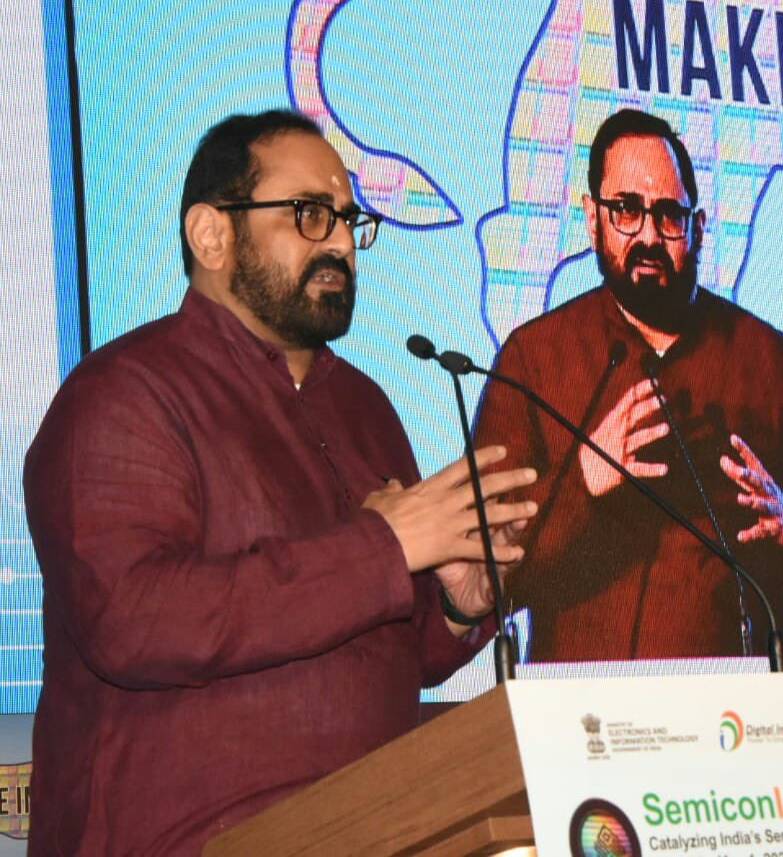Rajeev Chandrasekhar said the govt has been cognizant of the rapid pace of digitalization thrust upon the country by pandemic and the ability to face this calamity with resilience has been appreciated
Bengaluru, NFAPost: India suffered $150 billion – $200 billion economic loss due to lockdowns in the pandemic, but the country has emerged stronger despite the economic setbacks, said Minister of State for Electronics & Information Technology and Skill Development & Entrepreneurship Rajeev Chandrasekhar.
“The world has been through one of the worst Black Swan phases in recent times. India has suffered $150 billion – $200 billion economic loss due to lockdowns in the pandemic,” said Rajeev Chandrasekhar at the second day of the SemiconIndia-2022 conference in Bengaluru.
“Given our vast country and populace, India has shown great resilience and done exceptionally well with its vaccination program, healthcare and financial support and other welfare schemes for its citizens,” said the Minister.
He said the government has been cognizant of the rapid pace of digitalization thrust upon the country by pandemic and the ability to face this calamity with resilience has been appreciated by the whole world. He said that today India’s technology ecosystem is recognized for its excellence the world over and the startup ecosystem replete with many unicorns is a testimony to this fact.
“The semiconductor design and manufacturing sector is a critical component of our next phase of growth and to catalyze this growth,” said Chandrasekhar. “We have laid down a calibrated roadmap ably supported by conducive policies and concerted effort and close collaboration with the industry,” said Rajeev Chandrasekhar.
At the Semicon India-2022 conference, the industry captains in attendance lauded the government’s efforts and vision in turning the country into a semiconductor hub. Among them was Sanjay Mehrotra, president and CEO, Micron Technology, who emphasised on the role of the semiconductor sector in ensuring an Atmanirbhar Bharat, made possible by the collective efforts of the industry, academia, and the government.
Another top executive Randhir Thakur, president, Intel Foundry Services, reiterated the critical role the domestic semiconductor sector is playing and will continue to play in ensuring economic growth and security. Semiconductors are the new oil in the digital age. Providing impetus to the homegrown innovators and welcoming global players to set up manufacturing in the country will propel India’s tech sector growth in years to come.
Jim Keller, the CEO of AI chip firm Tenstorrent, emphasised on the all-pervasive nature of semiconductors in our everyday lives. “With the consumer base and data growing at a rapid pace, there is a need for the semiconductor ecosystem to keep pace,” said Keller. “India will play a critical role from a talent and technology perspective globally.”
During the conference, the government also solidified its partnerships with the industry by showcasing commitment and a keen interest to work with the stakeholders. These efforts are being made toward actualizing the milestones set and translating its vision into a reality.
At the conference, it was also revealed that India has received investment proposals from five global semicon majors to set up semiconductor fabs and display fabs locally in India. The proposals are for manufacturing the chips used in a wide array of products including consumer devices, automotive and personal electronics. The proposals received so far are to the tune of $20.5 billion in the greenfield segment of display and semiconductor chip manufacturing.
One of the stakeholders at the Semicon India conference was Applied Materials, a leader in material engineering solutions and the largest semiconductor display equipment manufacturer in the world. The firm made an announcement to invest Rs 1800 crore rupees in India.
The firm said that the government’s mission mode approach to evolving the country’s semiconductor sector, together with the Ease-of-Business initiatives and scaling up of indigenous electronics end-manufacturing, are positive and practical steps to enable India’s Semiconductor Mission. Applied Materials India recently invested $50 million to purchase land in Whitefield, Bengaluru.
“We plan to expand our engineering infrastructure and support the next phase of our growth,” said Srinivas Satya, country president and managing director, Applied Materials India Private Limited. “We expect this investment to support future product development and R&D, as well as benefit the development of the local supply chain.”
At the event, a memorandum of understanding (MoU) was also signed between the industry association SEMI and manufacturing supply chain and Electronic Industries Association Of India (ELCINA). A partnership was signed between C-DAC (Centre for Development of Advanced Computing) and Qualcomm for partnership in semiconductors which will target semiconductor design startups in line with the objectives of the PLI scheme. Partnerships were also signed for training and skilling tech workforce for the semiconductor sector.





